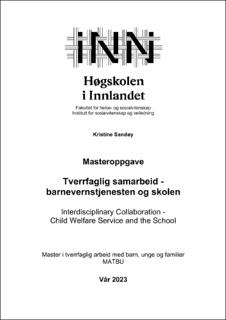| dc.contributor.advisor | | |
| dc.contributor.author | Kristine Sandøy | |
| dc.date.accessioned | 2023-07-18T16:10:44Z | |
| dc.date.available | 2023-07-18T16:10:44Z | |
| dc.date.issued | 2023 | |
| dc.identifier | no.inn:inspera:145691691:101940933 | |
| dc.identifier.uri | https://hdl.handle.net/11250/3079797 | |
| dc.description.abstract | Denne masteroppgaven forsker på samarbeidet mellom barnevernstjenesten og skolen. Mange barn, unge og familier med sammensatte utfordringer og behov har kontakt med barnevernstjenesten i løpet av livet. Bakgrunnen for masteroppgaven er at samarbeid mellom barnevernstjenesten og skolen er viktig for barnets utvikling. Skolen er en av de arenaene barnet tilbringer mest tid på som barn. Forskning viser at mange barn som har hatt kontakt med barnevernet strever med det skolefaglige både som barn og i voksen alder. Ofte har de som strever med det skolefaglige også utfordringer når det kommer til psykisk helse og atferdsuttrykk som angst og depresjon eller aggressivitet (Hansen et al., 2020).
Masteroppgavens problemstilling er følgende:
Hvilke faktorer opplever barnevernsansatte og skoleansatte bidrar til godt samarbeid eller konflikt, og hvordan kan dette få betydning for samarbeidet?
For å belyse problemstilling har studien følgende forskningsspørsmål:
o Hva fremhever de ansatte som viktig eller utfordrende i samarbeidet?
o Hvilke perspektiver har de ansatte på barnets situasjon?
o Hvordan virker samarbeidet med foreldrene inn på det tverrfaglige samarbeidet?
Det teoretiske rammeverket for masteroppgaven består av samarbeid og tverrfaglig samarbeid, konflikthåndtering og samarbeidskompetanse. Her gjøres det rede for systemisk forståelse og kommunikasjon, samt relasjonskompetanse. Den teoretiske rammen inkluderer også utsatte barn, unge og familier, samt samarbeid med foreldre. Masteroppgaven er en kvalitativ studie med semistrukturerte intervjuer som metode. Det intervjues tre ansatte fra barnevernstjenesten og fire ansatte fra barneskolen. Intervjuene er gjennomført fysisk og digitalt på Zoom. Det benyttes en fenomenologisk og hermeneutisk tilnærming. Det er brukt en tematisk analyse.
Funnene viser at informantene i stor grad fremhever viktige og utfordrende sider ved de samme hovedområdene. Funnene viser at hvordan instansene organiserer det tverrfaglige samarbeidet har betydning for samarbeidet mellom instansene. Det gjelder også hvordan det tverrfaglige samarbeidet organiseres i praksis rundt det enkelte barnet. Forankring i ledelse og samarbeidskultur fremheves. Andre funn viser at kommunikasjon, informasjon og kjennskap til hverandre er nøkkelelementer. Det er spesielt kjennskap til barnevernstjenesten som har betydning for informantene.
Videre viser funnene at samarbeidet mellom barnevernstjenesten og skolen ofte skjer når situasjonen er anstrengt. De ansattes konflikthåndtering og samarbeidskompetanse er av stor betydning for samarbeidet. Hvordan instansene forstår barnets situasjon, samt samarbeid med foreldrene, er også av stor betydning. Funnene diskuteres opp mot det teoretiske rammeverket. Funnene diskuteres ut fra at god ledelse og samarbeidskultur legger til rette for et godt samarbeid, kunnskap og deling av informasjon, samt samarbeid når situasjonen er anstrengt. | |
| dc.description.abstract | This master's thesis examines the collaboration between the Child Welfare Service and the schools. Many children, young people and families with complex challenges and needs come in contact with the Child Welfare Service at some point during their lives. The purpose for this master's thesis is to highlight the importance of collaboration between the Child Welfare Service and the schools, and how this has a key impact on the child's development. One of the arenas where a child spends the most time, is at school. Research shows that many children who have had contact with Child Welfare Services struggle with academics both as children and as adults. Often times those who struggle with academics also have challenges when it comes to mental health and behavioral expressions such as anxiety and depression or aggressiveness (Hansen et al., 2020).
The Master's thesis' explore the following:
Which factors do social workers and school staff experience as contributing to good cooperation or conflict, and how can this have an impact on their collaboration?
To shed light on the issue, the study has the following research questions:
o What do the employees highlight as important or challenging in the collaboration?
o What perspectives do the staff have on the child's situation?
o How does the cooperation with the parents affect the interdisciplinary collaboration?
The theoretical framework for the master's thesis consists of cooperation and interdisciplinary collaboration, conflict management and cooperation skills. Systemic understanding and communication, and relational competence are explained here. The theoretical framework also includes vulnerable children, young people and families, as well as cooperation with parents. The master's thesis is a qualitative study with semi-structured interviews as method. Three employees from the Child Welfare Service and four employees from the primary school are interviewed. The interviews are conducted physically and digitally on Zoom. A phenomenological and hermeneutic approach is used. A thematic analysis has been used.
The findings indicate that the informants largely highlight important and challenging aspects of the same main areas. The results show that how the agencies organize the interdisciplinary collaboration is important for the collaboration between the agencies. It also applies to how the interdisciplinary collaboration is organized in practice around the individual child. Anchoring in management and a culture of collaboration are emphasized. Other findings show that communication, information and familiarity with each other are key elements. Knowledge of the Child Welfare Service is particularly important for the informants.
Furthermore, the results show that the collaboration between the Child Welfare Service and the school often occur when the situation is strained. The employees' conflict management and cooperation skills are of great importance to the cooperation. How the authorities understand the child's situation, as well as cooperation with the parents, is also of great importance. The results are discussed in light of the theoretical framework. The results are discussed on the basis that good management and a culture of cooperation facilitate good cooperation, knowledge and sharing of information, as well as cooperation when the situation is strained. | |
| dc.language | nob | |
| dc.publisher | Inland Norway University | |
| dc.title | Tverrfaglig samarbeid -barnevernstjenesten og skolen | |
| dc.type | Master thesis | |
